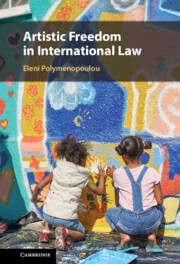Book contents
- Artistic Freedom in International Law
- Artistic Freedom in International Law
- Copyright page
- Contents
- Acknowledgements
- Table of Cases
- Introduction
- 1 Defining Art
- 2 The Nature, Scope and Protection of Artistic Freedom
- 3 Censorship and Restrictions
- 4 Positive Obligations in Relation to Artistic Freedom
- 5 Street Art, Graffiti and Art in Public Space
- 6 Public Morality, Obscenity and the Arts
- 7 Blasphemous Paintings, Cartoons and Other Religiously Offensive Art
- Index
3 - Censorship and Restrictions
Published online by Cambridge University Press: 06 April 2023
- Artistic Freedom in International Law
- Artistic Freedom in International Law
- Copyright page
- Contents
- Acknowledgements
- Table of Cases
- Introduction
- 1 Defining Art
- 2 The Nature, Scope and Protection of Artistic Freedom
- 3 Censorship and Restrictions
- 4 Positive Obligations in Relation to Artistic Freedom
- 5 Street Art, Graffiti and Art in Public Space
- 6 Public Morality, Obscenity and the Arts
- 7 Blasphemous Paintings, Cartoons and Other Religiously Offensive Art
- Index
Summary
This chapter examines the question of prior restraints and other limitations to artistic freedom, pointing to the lack of a precise definition of ‘censorship’. Which grounds of prior restraint are legitimate or necessary under international law? is there an obligation for States to ban exhibitions such as Mirroring Evil: Nazi Imagery or the exhibition Ode to the Sea displaying artworks made by prisoners from Guantànamo Bay? When can States legitimately restrict artistic freedom? And how do international bodies draw the fine line between illegitimate censorship, legitimate restrictions and regulation? The chapter discusses the problem of artistic expressions inciting to hatred and other types of incitement (negationism, revisionism and Holocaust denial), in light of international standards. It further offers a more detailed approach to the methodology of human rights bodies in defining limitations to artistic freedom (and more broadly balancing conflicting interests), including the problem of artists’ ‘duties and responsibilities’. Finally, it examines the responsibility of non-State actors for human rights violations, if any, in the case of private exhibitions and events that incite to racism, hatred or misogyny, as well as similar issues arising in digital arts, on the web and social media platforms.
Keywords
- Type
- Chapter
- Information
- Artistic Freedom in International Law , pp. 68 - 98Publisher: Cambridge University PressPrint publication year: 2023



